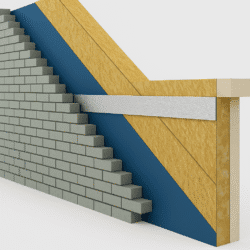The Benefits of Insulation for Underfloor Heating: A Comprehensive Guide

Underfloor heating (UFH) has become an increasingly popular heating solution in UK homes. It provides a luxurious warmth that radiates from the floor, creating a comfortable and even temperature throughout the room. However, to truly maximise the efficiency and effectiveness of UFH, proper insulation for underfloor heating is absolutely important. This guide explores the crucial role that insulation plays in underfloor heating systems and the long-term benefits it offers.
Understanding Underfloor Heating
Before diving into insulation, let’s briefly recap what underfloor heating is. Unlike traditional radiators that heat the air, UFH warms the floor surface, which then radiates heat upwards. This radiant heat is more efficient and comfortable as it distributes warmth evenly, eliminating cold spots and draughts.
UFH systems can be either:
- Wet systems: These circulate warm water through pipes embedded in the floor.
- Electric systems: These use electric cables or mats to heat the floor.
Both types benefit significantly from effective insulation.
Why is Insulation Crucial for Underfloor Heating?
Without adequate insulation, a significant portion of the heat generated by your UFH system will be lost downwards, heating the subfloor instead of the room above. This leads to:
- Increased Energy Consumption: Your boiler or heating system has to work harder to achieve the desired temperature, resulting in higher energy bills.
- Slower Heat-Up Times: It takes longer for the room to reach a comfortable temperature, reducing the responsiveness of the system.
- Reduced Efficiency: The system operates less efficiently, wasting energy and increasing running costs.
- Potential Damage: In some cases, prolonged heat exposure to the subfloor can cause damage.
Insulation acts as a barrier, directing the heat upwards into the room where it’s needed, maximising efficiency and comfort.
Types of Insulation Suitable for Underfloor Heating
Various insulation materials can be used with UFH, but some are more effective than others.
- Rigid Insulation Boards: These boards, such as PIR (Polyisocyanurate) or EPS (Expanded Polystyrene), are a popular choice. They offer good thermal resistance and compressive strength, which is important for supporting the floor structure.
- Mineral Wool Insulation: While less common for floors due to its compressibility, denser mineral wool can be used in certain situations. It’s excellent for acoustic insulation as well.
Factors to Consider When Choosing Insulation
Selecting the right insulation for underfloor heating is critical:
- Thermal Resistance (R-value): This measures the insulation’s ability to resist heat flow. Higher R-values are better.
- Thermal Conductivity (Lambda Value): This measures how well a material conducts heat. Lower lambda values are better.
- Compressive Strength: The insulation must be able to withstand the weight of the floor and any loads placed upon it.
- Moisture Resistance: Especially important in bathrooms or kitchens.
- Thickness: Consider available floor height and the desired level of insulation.
Insulation Solutions Available at Online Insulation
At Online Insulation, we offer a selection of insulation products well-suited for underfloor heating systems. Here are some of our products:
- Rockwool Rockfloor Thermal Floor Insulation Slab: These slabs provide excellent thermal and acoustic insulation, ideal for use in floors. Their density and resilience make them suitable for supporting floor loads.
- Kingspan Kooltherm K103 Floorboard: These boards offer premium performance with a thin profile, maximising energy efficiency in floor constructions.
- Kingspan TF70 Thermafloor: These PIR insulation boards are designed for use in floor applications, offering a balance of thermal performance and compressive strength.
Installation Best Practices
- Clean and Level Subfloor: Ensure the subfloor is clean, level, and free of debris.
- Damp Proof Membrane (DPM): Install a DPM if necessary to prevent moisture rising from the ground.
- Insulation Layer: Lay the insulation boards tightly together, ensuring no gaps.
- UFH System Installation: Install the UFH pipes or cables according to the manufacturer’s instructions.
- Screed or Flooring: Cover the UFH system with a screed layer (for wet systems) or the final flooring material.
Long-Term Benefits of Proper Insulation
- Reduced Energy Bills: Proper insulation minimises heat loss, leading to significant savings on heating costs.
- Faster Heat-Up Times: The room heats up more quickly and efficiently.
- Increased Comfort: Enjoy a consistently warm and comfortable floor surface.
- Prolonged System Lifespan: Reduced strain on the heating system can extend its lifespan.
- Environmental Benefits: Lower energy consumption contributes to a reduced carbon footprint.
Conclusion
Insulating your underfloor heating system is a worthwhile investment that pays off in increased comfort, lower energy bills, and a more sustainable home. Choose the right insulation materials and follow proper installation techniques to reap the full benefits of this efficient heating solution.


























